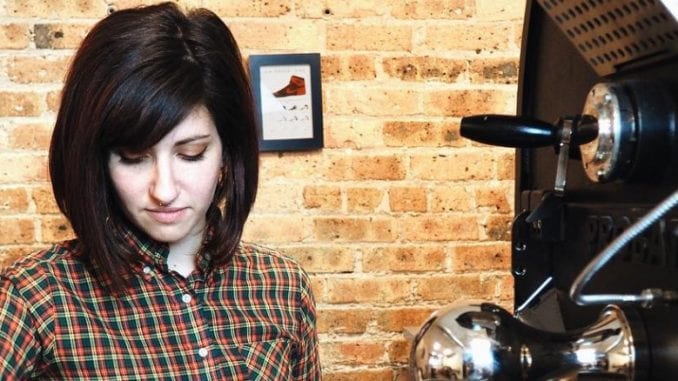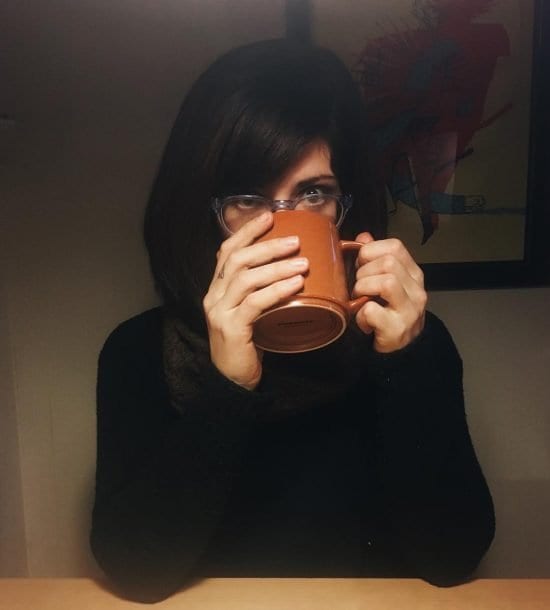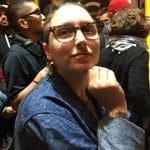
Mandy Spirito of Halfwit Coffee Roasters talks about the physical limitations they’ve faced in roasting, and some easy and inexpensive tools and tricks to overcome barriers.
BY RJ JOSEPH
SPECIAL TO BARISTA MAGAZINE
Photos by Kamila Krauze
This article accompanies a piece in the December 2017 + January 2018 issue of Barista Magazine, “Ableism Is an Issue We Should Start Addressing in the Coffee Industry.”
In the following interview I talk with Mandy Spirito, director of coffee at Halfwit Coffee Roasters in Chicago. Standing at just 5’2”, they’ve been roasting for four years and in coffee for 10. They share their insight into the challenges and barriers faced by people with perceived physical limitations and disabilities in the coffee roasting sector, as well as a wealth of inexpensive and valuable solutions.
RJ Joseph: Have you ever faced or seen others face barriers to getting hired as a roaster because of gender/height/perceived physical limitations?
Mandy Spirito: I’ve certainly faced barriers to being hired as a roaster, and I think most people who are read as women can relate. As a 5’2” nonbinary femme, I was constantly getting told I wasn’t strong enough, despite the fact that I can lift more than quite a few of my male friends. I can imagine that barrier is even more difficult for differently abled folks.
RJJ: Have you ever been injured or seen someone injured because of systems that were unsafe or didn’t accommodate their height/physical ability?
MS: I’ve seen a few injuries in roasteries, but most injuries I’ve seen are physical strains that happen over time. It’s rare that I see a really dangerous or shocking accident on the production floor. I’ve known and worked with a lot of people who suffer from lower back pain from lifting improperly or tackling too much when it comes to green coffee bags. Production roasters and production workers often have wrist issues from bagging or using triers. Lifting coffee bags is often pretty difficult for smaller folks; it can cause a lot of shoulder strain. Repetitive motion is really difficult if table height isn’t accurate for production folks.
It’s hard to tackle long-term problems like this, to be honest, apart from educating folks on good lifting and making sure people are taking appropriate breaks from repetitive work.

RJJ: Have you ever helped to make hiring in roasting or roasting spaces themselves more inclusive for physical disability or difference?
MS: Well, at Wrecking Ball, Nick and I built a simple device to lift green coffee bags, appropriately named “the hoist.”
It took us about an afternoon to build it, although admittedly, we already had a large central beam in the warehouse to support the weight. The idea to build it was born out of the notion that no one, able-bodied or otherwise, should have to put so much stress on their body. You can talk all you want about how you can toss a 70kg bag around—I know I have—but at the end of the day, it’s long-term wear and tear on your body.
The hoist also increased productivity for us, allowing us to move through bagging, binning, and scooping much faster with much less strain.
RJJ: Do you feel that increasing diversity (including physical and gender diversity) in a group helps problem-solving, morale, and/or general operations?
MS: Yes, absolutely. I think the coffee industry seriously overlooks how physically demanding our work can be. Roasting seems to be the obvious one (lots of heavy lifting and all that), and production work is heavy lifting, mostly repetitive movements that can really put a strain on your wrists and shoulders, and the stress of standing on your feet all day. I know a lot of roasters, including myself, who have wrist issues because of production work or the simple act of using a trier.
If you consider making workflow accessible to a more diverse pool of candidates, you’re also increasing efficiency; instead of accepting norms and simple versions of workflow, you begin to think outside of the box. What might a differently abled person find difficult? How do we ease physical strain? I don’t think we often consider these things with able-bodied folks; I’ve definitely seen the brute strength part of the job glamorized in its way. But it doesn’t take much to make these changes.
RJJ: What are some strategies you think roasting companies can take to open up their roasting departments, spaces, and programs to more types of bodies?
MS: What height are my production tables? I know for a fact that ULINE has tables with adjustable heights. What about scale placement? Can I put a floor scale on a raised platform to make scooping easier? Making green coffee storage easier to access is possible; I’ve seen ingredient bins that are lower to the ground than the larger Brute bins that I usually see in roasteries, and you can add rollers to them as well. Raised platforms are a quick fix for so many situations, and you can build ’em in no time.
These are simple things to consider with simple fixes, but they can have a huge effect on how inclusive your workplace really is, and they’re equally efficient for people who are able-bodied. Oh yeah—when it comes to considering height, those of us under 5’5” are usually getting the short end of the stick, as it were. I think it’s commonly thought that it’s difficult to appeal to all types, but in this situation, a few small tools can make a world of difference.
RJJ: Is there anything else you want to say about roasting, inclusion, disability, policy, or anything else?
MS: There are roasters out there doing it, right now. Seriously. It’s not some alien thing. Are you posting a job publicly? It’s correct to inform folks that the job is physical, but you can actively add that you are willing to make accommodations for differently abled folks. I’ve said it quite a few times, but it’s a simple step toward accessibility and inclusion that can make a very big difference.
 ABOUT THE AUTHOR
ABOUT THE AUTHOR
RJ Joseph roasts coffee and writes a blog called Queer Cup in addition to her other adventures in coffee journalism. Her writing focuses primarily on equity, workers’ rights, and alternatives to the status quo. In her free time she loves cooking, reading, and being in Oakland, Calif. You can follow her on Instagram and Twitter.


I love this posting. I hated the attitude during the whole Second Wave that this was a man’s game and we couldn’t be taken seriously in a role other than barista. We couldn’t be in management, we couldn’t own, we couldn’t roast, etc. This article just goes to show that times are changing and there is a role for us in the industry. Well done Mandy and RJ!